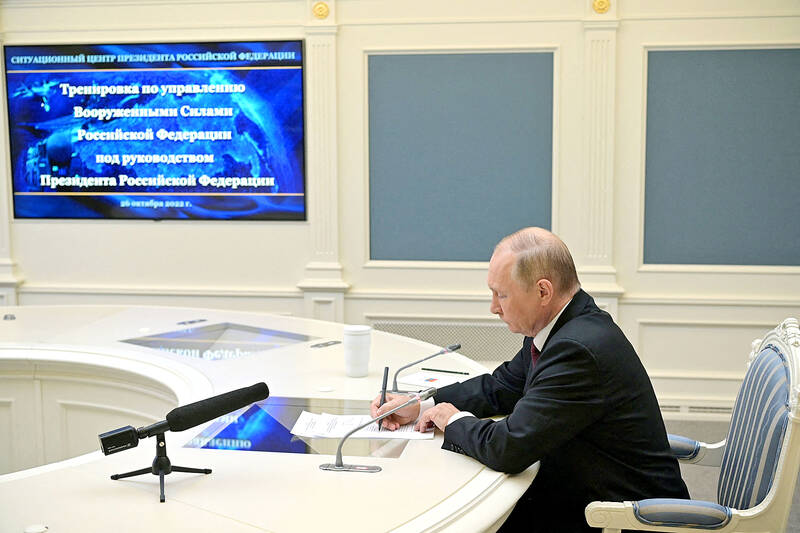Moscow yesterday indicated that it was moving swiftly toward revoking ratification for the Comprehensive Nuclear Test Ban Treaty (CTBT) after Russian President Vladimir Putin held out the possibility of resuming nuclear testing.
A resumption in nuclear tests by Russia, the US or both would be profoundly destabilizing at a time when tensions between the two nations are greater than at any time since the 1962 Cuban Missile Crisis.
Putin on Thursday said Russia’s nuclear doctrine did not need updating, but that he was not yet ready to say whether or not Russia needed to resume nuclear tests.

Photo: Reuters
The Kremlin chief said that Russia should look at revoking ratification of the CTBT as the US had signed it, but not ratified.
Just hours after Putin’s words, Russian Duma Speaker Vyacheslav Volodin said the legislature’s bosses would swiftly consider the need to revoke Russia’s ratification for the treaty.
“The situation in the world has changed,” Volodin said.
“Washington and Brussels have unleashed a war against our country. At the next meeting of the State Duma Council, we will definitely discuss the issue of revoking the ratification of the Comprehensive Nuclear Test Ban Treaty,” he said.
Putin’s words, followed by Volodin’s, indicate that Russia is almost certain to revoke ratification of the treaty, which bans nuclear explosions by everyone, everywhere.
Russia, which inherited the Soviet Union’s nuclear weapons, has the world’s biggest store of nuclear warheads.
In the five decades between 1945 and the 1996 CTBT, more than 2,000 nuclear tests were carried out, 1,032 of them by the US and 715 by the Soviet Union, according to the UN.
The Soviet Union last tested in 1990. The US last tested in 1992.
Since the CTBT was signed, 10 nuclear tests have taken place. India conducted two in 1998, Pakistan also two in 1998, and North Korea conducted tests in 2006, 2009, 2013, 2016 (twice) and 2017, according to the UN.

DIALOGUE: US president-elect Donald Trump on his Truth Social platform confirmed that he had spoken with Xi, saying ‘the call was a very good one’ for the US and China US president-elect Donald Trump and Chinese President Xi Jinping (習近平) discussed Taiwan, trade, fentanyl and TikTok in a phone call on Friday, just days before Trump heads back to the White House with vows to impose tariffs and other measures on the US’ biggest rival. Despite that, Xi congratulated Trump on his second term and pushed for improved ties, the Chinese Ministry of Foreign Affairs said. The call came the same day that the US Supreme Court backed a law banning TikTok unless it is sold by its China-based parent company. “We both attach great importance to interaction, hope for

‘GREAT OPPRTUNITY’: The Paraguayan president made the remarks following Donald Trump’s tapping of several figures with deep Latin America expertise for his Cabinet Paraguay President Santiago Pena called US president-elect Donald Trump’s incoming foreign policy team a “dream come true” as his nation stands to become more relevant in the next US administration. “It’s a great opportunity for us to advance very, very fast in the bilateral agenda on trade, security, rule of law and make Paraguay a much closer ally” to the US, Pena said in an interview in Washington ahead of Trump’s inauguration today. “One of the biggest challenges for Paraguay was that image of an island surrounded by land, a country that was isolated and not many people know about it,”

‘FIGHT TO THE END’: Attacking a court is ‘unprecedented’ in South Korea and those involved would likely face jail time, a South Korean political pundit said Supporters of impeached South Korean President Yoon Suk-yeol yesterday stormed a Seoul court after a judge extended the impeached leader’s detention over his ill-fated attempt to impose martial law. Tens of thousands of people had gathered outside the Seoul Western District Court on Saturday in a show of support for Yoon, who became South Korea’s first sitting head of state to be arrested in a dawn raid last week. After the court extended his detention on Saturday, the president’s supporters smashed windows and doors as they rushed inside the building. Hundreds of police officers charged into the court, arresting dozens and denouncing an

CYBERSCAM: Anne, an interior decorator with mental health problems, spent a year and a half believing she was communicating with Brad Pitt and lost US$855,259 A French woman who revealed on TV how she had lost her life savings to scammers posing as Brad Pitt has faced a wave of online harassment and mockery, leading the interview to be withdrawn on Tuesday. The woman, named as Anne, told the Seven to Eight program on the TF1 channel how she had believed she was in a romantic relationship with the Hollywood star, leading her to divorce her husband and transfer 830,000 euros (US$855,259). The scammers used fake social media and WhatsApp accounts, as well as artificial intelligence image-creating technology to send Anne selfies and other messages